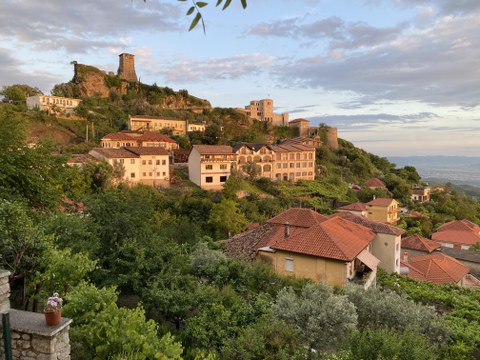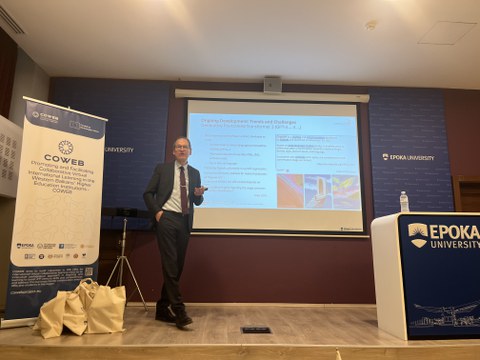Sep 11, 2024
Blended mobility project between TU Dresden and EPOKA University successfully completed
TUD Dresden University of Technology and EPOKA University from Albania continue their successful collaboration within the Virtual Collaborative Learning Module (VCL) and demonstrate with their innovative blended mobility approach how academic exchange and intercultural collaboration can be optimized by combining virtual and physical mobility.
Blended mobility: a pioneering approach to global learning
Blended mobility is an innovative concept that combines the benefits of virtual and physical mobility in academic collaboration. The VCL module makes full use of this concept: It combines the flexibility and global connectivity of virtual learning with the valuable experiences made possible by face-to-face exchanges on site. This combination creates a learning environment that allows students to not only develop academic skills, but also strengthen their cultural, linguistic and social competencies. This year's VCL programme under the theme "Conceptualizing Tirana as a Smart City" shows how the VCL framework and blended mobility contribute to the further development of international cooperation. Students were given the opportunity to work both digitally and on site on forward-looking projects that address real social challenges.
Physical and virtual phases: Deeper collaboration through blended mobility
The blended mobility concept of the VCL program is divided into two clearly separated phases. The first physical phase took place from April 8 to 12, 2024, when 18 students from EPOKA University traveled to Dresden. This week laid the foundation for the subsequent eight-week virtual collaboration, in which mixed teams from Germany and Albania developed solutions to smart city challenges. This phase allowed students to work in global teams and use digital tools to advance their projects with the support of professors and e-tutors. The personal exchange during the face-to-face week in Dresden strengthened the group dynamic processes and thus promoted the efficiency of the virtual collaboration. The virtual phase then offered students the opportunity to further refine their concepts and develop solutions in the digital space. By working closely together via digital platforms, the teams were able to exchange and further develop their ideas across national borders.
The highlight of the program was the second physical phase, a week-long visit to Tirana from 27 to 31 May 2024, where the teams presented their digitally developed projects to an international jury. The TiranaLink project, which was developed by students from both universities, impressed the jury with its innovative ideas for the further development of Tirana as a smart city. A visit to the Albanian Ministry of Infrastructure and Energy gave the participants an in-depth insight into current smart city initiatives. This personal encounter showed the full potential of blended mobility, as the previously developed concepts were now discussed and further developed in a real urban context.
Cultural excursions and social interactions: The added value of blended mobility
In addition to the academic work, the physical phase of the program in Tirana offered numerous cultural excursions and social activities that promoted intercultural exchange in a way that would not be possible in purely virtual programs. Visits to historical sites such as Kruja Castle and the BunkArt Museum gave students a deep insight into Albanian history and enhanced their intercultural skills. These experiences strengthened the relationships between the participants and enriched the exchange on a personal level. Social activities such as volleyball games, barbecues and paintball also helped to strengthen interpersonal cohesion and make the blended mobility experience a holistic learning process that went far beyond academic content.
Blended mobility as the future of international exchange
The successful implementation of the blended mobility approach within the VCL module shows how valuable the combination of virtual and physical mobility is in today's globalized educational landscape. Supported by the Erasmus+ KA171 program and the COWEB project, the VCL framework demonstrates how international and interdisciplinary collaboration can be effectively implemented in hybrid learning environments. Students not only gain academic knowledge, but also the ability to work in global teams, use digital tools and move confidently in different cultural contexts.
This program serves as a model for future international projects and underscores the central role of blended mobility in training leaders who are prepared for an increasingly interconnected world. It illustrates that the future of academic exchange lies in the intelligent combination of virtual and physical encounters - a model that is of great importance not only in higher education, but also in promoting global citizenship and sustainable innovation.




